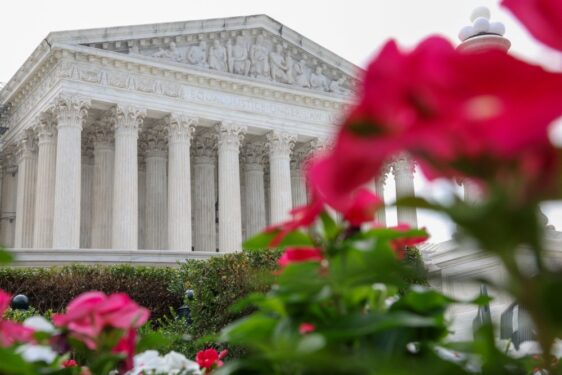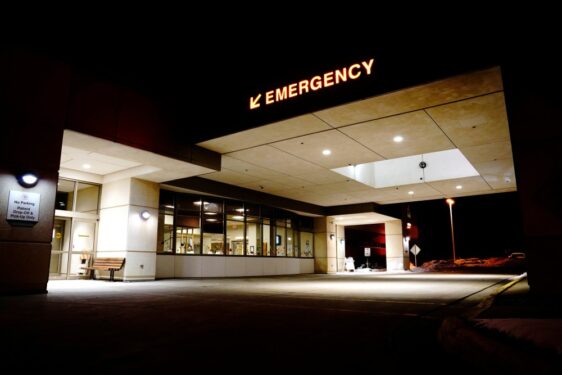
WASHINGTON — U.S. Supreme Court justices were divided during April 24 oral arguments that considered whether the federal law requiring hospitals to provide “necessary stabilizing treatment” in emergencies overrides an Idaho law that bans most abortions.
The federal law in question is the 1986 Emergency Medical Treatment and Labor Act meant to ensure that all patients have access to emergency services even if they are unable to pay at hospitals that participate in Medicare.
Idaho’s Defense for Life Act, a near-total abortion ban with an exemption to prevent the mother’s death, went into effect after the Dobbs decision in 2022. It imposes criminal penalties and suspensions of medical licenses on doctors who perform abortions unless the mother’s life is in danger.
The state law had been put on hold by a district court judge after the federal government sued the state, but when the Supreme Court decided to take the case in January, it allowed the law to take effect while litigation continued.
In oral arguments that took two hours, Idaho Solicitor General Joshua Turner told the justices that the federal government doesn’t get to decide when abortions are required standard of care in hospital emergency rooms.
He also stressed that states must be allowed to regulate how they provide health care — including abortion — in the same way that they license medical personnel and require hospitals to comply with state laws.
Gabriella McIntyre, legal counsel at the Alliance Defending Freedom, representing Idaho, said the case is an attempt by the Biden administration to impose “a national mandate on abortion.”
U.S. Solicitor General Elizabeth Prelogar, representing the federal government, said the state’s abortion ban has major consequences for pregnant women and emergency room doctors.
“Today, doctors in Idaho and the women in Idaho are in an impossible position,” she said. “If a woman comes to an emergency room facing a grave threat to her health, but she isn’t yet facing death, doctors either have to delay treatment and allow her condition to materially deteriorate or they’re airlifting her out of the state so she can get the emergency care that she needs.”

Justices Elena Kagan, Sonia Sotomayor, and Ketanji Brown Jackson asked Turner several questions about Idaho’s interpretation of the federal law. Kagan asked what if a pregnant woman came to the emergency room with a serious health condition that would not lead to her death but could cause loss of organs or fertility if an abortion was not performed.
In response, Turner said: “Yes, Idaho law does say that abortions in that case aren’t allowed.”
Justice Samuel Alito mentioned that the federal law includes several mentions of the phrase “unborn child.”
“Doesn’t that tell us something?” he asked. He said it likely meant that “the hospital must try to eliminate any immediate threat to the child” and that “performing an abortion is antithetical to that duty.”
The U.S. Conference of Catholic Bishops filed a friend of the court brief siding with Idaho and was joined by Catholic Health Care Leadership Alliance, Christ Medicus Foundation, National Catholic Bioethics Center, the Catholic Bar Association, and the Catholic Medical Association.
They urged the justices to reject “efforts to fabricate a federal abortion mandate that will override state law and, in so doing, violate the rights of religious health care providers who desire to treat and protect the lives and health of both the mother and her unborn baby in compliance with the text and purpose of EMTALA.”
They also said that by using the federal law to require individuals and entities to provide abortions, the Biden administration “has exceeded its statutory authority and acted contrary to the express will of Congress under federal law,” noting that “Congress has expressly prohibited the federal government from requiring health care entities to perform abortions.”
National Right to Life similarly filed a friend of the court brief siding with the Idaho law and arguing that the federal government’s “attempt to force hospital emergency rooms to perform abortions under the Emergency Medical Treatment and Active Labor Act is contrary to that federal law which was only meant to protect emergency room patients from being dumped and does not mandate that the hospital provide medical care that is contrary to state law.”
The court’s ruling could affect health care in emergency rooms in 22 states that have imposed restrictions on abortions, particularly in six states — like Idaho — that do not have exemptions to the abortion ban to protect the health of the mother.
A decision in the case is expected by summer.
